Neo-liberalism: Economic Policies and Societal Consequences
VerifiedAdded on 2020/03/16
|7
|1328
|48
Essay
AI Summary
This essay examines neo-liberalism, a policy model shifting economic control from the public to the private sector, intertwined with globalization. It discusses the impact of neo-liberalism on market economies, including increased efficiency and business expansion, but also highlights negative consequences such as wealth inequality and increased corruption. The essay references various scholars and their perspectives on neo-liberalism's advantages and disadvantages, emphasizing the debate over its effects on society, particularly the widening gap between the rich and the poor. It concludes that while neo-liberalism aims to benefit everyone by expanding the market and minimizing government intervention, it has resulted in significant societal disparities.
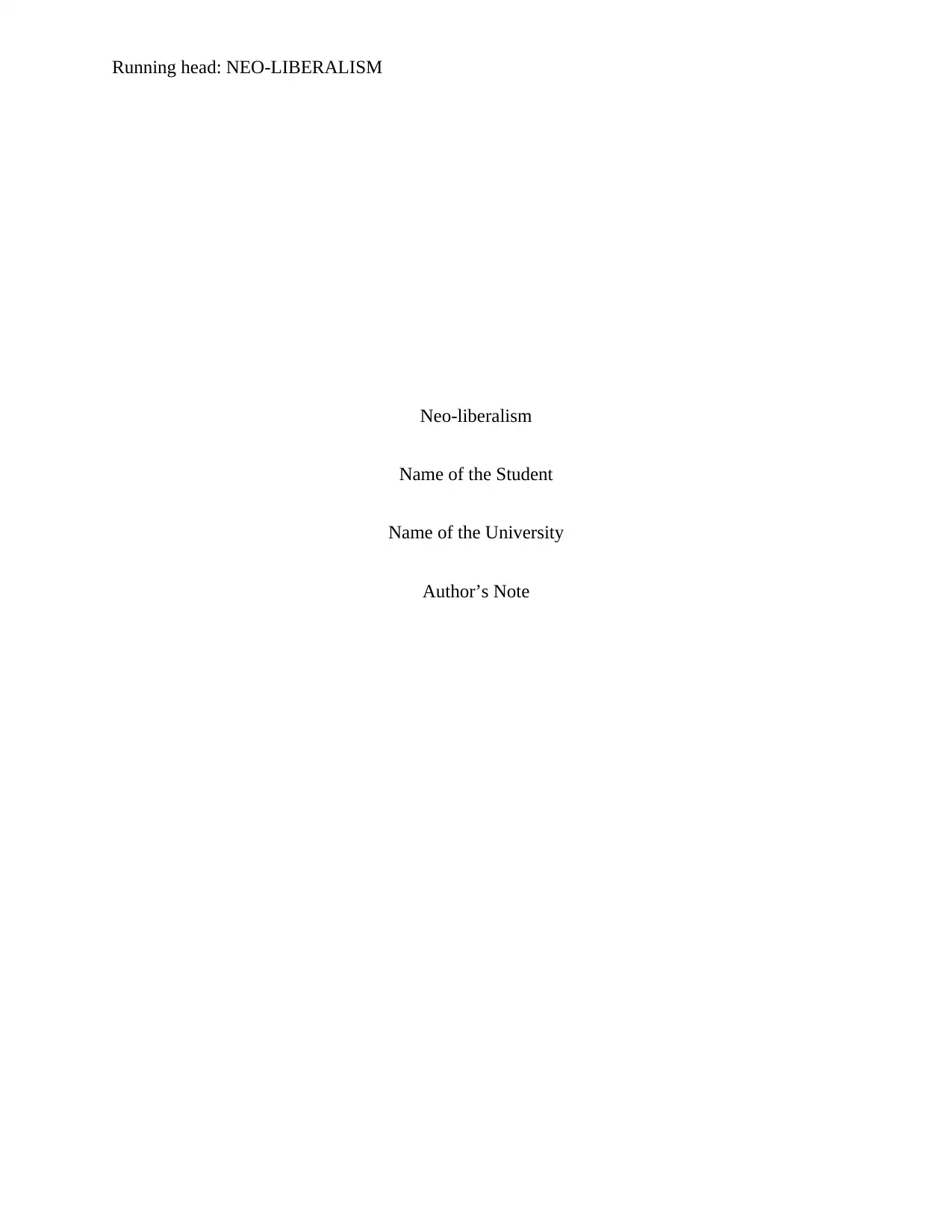
Running head: NEO-LIBERALISM
Neo-liberalism
Name of the Student
Name of the University
Author’s Note
Neo-liberalism
Name of the Student
Name of the University
Author’s Note
Paraphrase This Document
Need a fresh take? Get an instant paraphrase of this document with our AI Paraphraser
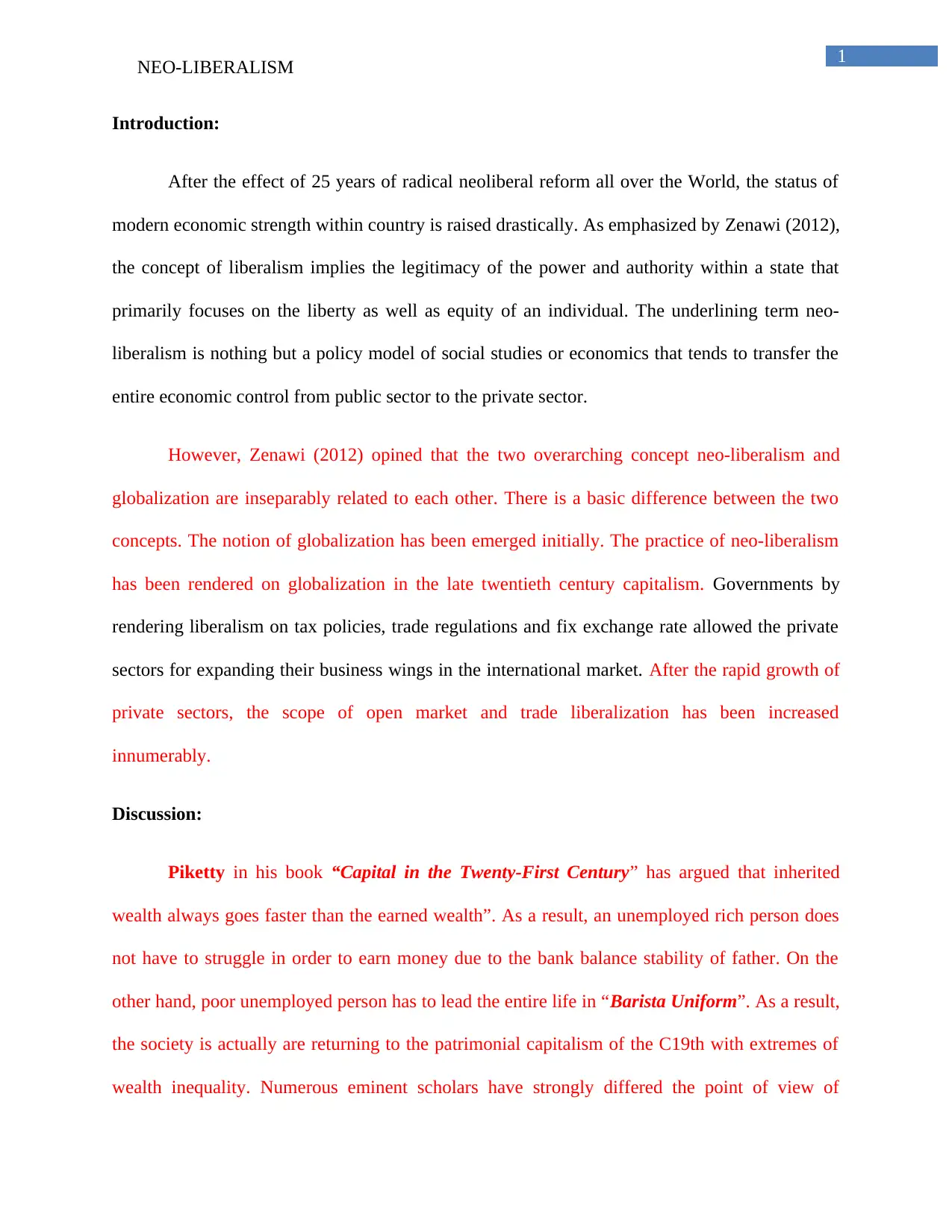
1
NEO-LIBERALISM
Introduction:
After the effect of 25 years of radical neoliberal reform all over the World, the status of
modern economic strength within country is raised drastically. As emphasized by Zenawi (2012),
the concept of liberalism implies the legitimacy of the power and authority within a state that
primarily focuses on the liberty as well as equity of an individual. The underlining term neo-
liberalism is nothing but a policy model of social studies or economics that tends to transfer the
entire economic control from public sector to the private sector.
However, Zenawi (2012) opined that the two overarching concept neo-liberalism and
globalization are inseparably related to each other. There is a basic difference between the two
concepts. The notion of globalization has been emerged initially. The practice of neo-liberalism
has been rendered on globalization in the late twentieth century capitalism. Governments by
rendering liberalism on tax policies, trade regulations and fix exchange rate allowed the private
sectors for expanding their business wings in the international market. After the rapid growth of
private sectors, the scope of open market and trade liberalization has been increased
innumerably.
Discussion:
Piketty in his book “Capital in the Twenty-First Century” has argued that inherited
wealth always goes faster than the earned wealth”. As a result, an unemployed rich person does
not have to struggle in order to earn money due to the bank balance stability of father. On the
other hand, poor unemployed person has to lead the entire life in “Barista Uniform”. As a result,
the society is actually are returning to the patrimonial capitalism of the C19th with extremes of
wealth inequality. Numerous eminent scholars have strongly differed the point of view of
NEO-LIBERALISM
Introduction:
After the effect of 25 years of radical neoliberal reform all over the World, the status of
modern economic strength within country is raised drastically. As emphasized by Zenawi (2012),
the concept of liberalism implies the legitimacy of the power and authority within a state that
primarily focuses on the liberty as well as equity of an individual. The underlining term neo-
liberalism is nothing but a policy model of social studies or economics that tends to transfer the
entire economic control from public sector to the private sector.
However, Zenawi (2012) opined that the two overarching concept neo-liberalism and
globalization are inseparably related to each other. There is a basic difference between the two
concepts. The notion of globalization has been emerged initially. The practice of neo-liberalism
has been rendered on globalization in the late twentieth century capitalism. Governments by
rendering liberalism on tax policies, trade regulations and fix exchange rate allowed the private
sectors for expanding their business wings in the international market. After the rapid growth of
private sectors, the scope of open market and trade liberalization has been increased
innumerably.
Discussion:
Piketty in his book “Capital in the Twenty-First Century” has argued that inherited
wealth always goes faster than the earned wealth”. As a result, an unemployed rich person does
not have to struggle in order to earn money due to the bank balance stability of father. On the
other hand, poor unemployed person has to lead the entire life in “Barista Uniform”. As a result,
the society is actually are returning to the patrimonial capitalism of the C19th with extremes of
wealth inequality. Numerous eminent scholars have strongly differed the point of view of
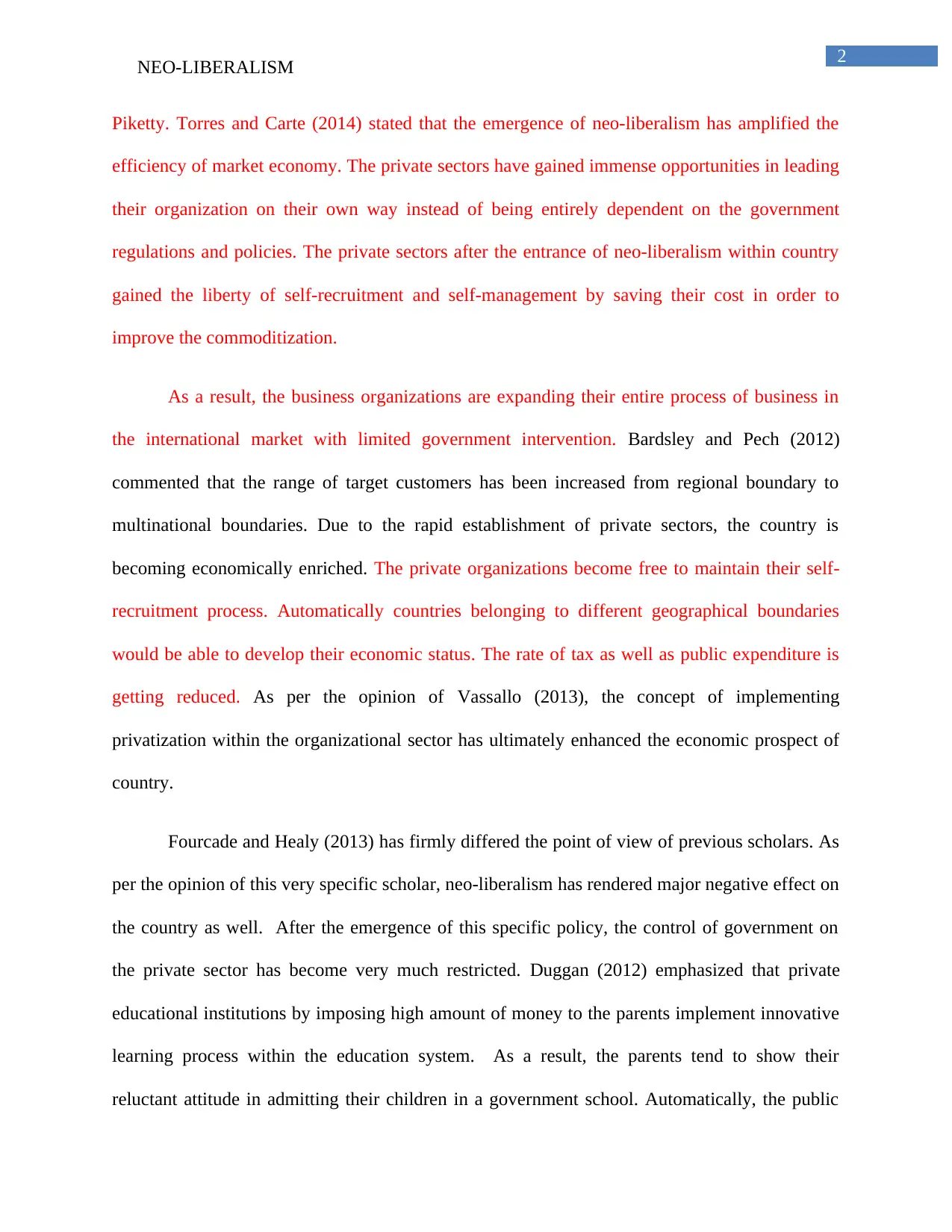
2
NEO-LIBERALISM
Piketty. Torres and Carte (2014) stated that the emergence of neo-liberalism has amplified the
efficiency of market economy. The private sectors have gained immense opportunities in leading
their organization on their own way instead of being entirely dependent on the government
regulations and policies. The private sectors after the entrance of neo-liberalism within country
gained the liberty of self-recruitment and self-management by saving their cost in order to
improve the commoditization.
As a result, the business organizations are expanding their entire process of business in
the international market with limited government intervention. Bardsley and Pech (2012)
commented that the range of target customers has been increased from regional boundary to
multinational boundaries. Due to the rapid establishment of private sectors, the country is
becoming economically enriched. The private organizations become free to maintain their self-
recruitment process. Automatically countries belonging to different geographical boundaries
would be able to develop their economic status. The rate of tax as well as public expenditure is
getting reduced. As per the opinion of Vassallo (2013), the concept of implementing
privatization within the organizational sector has ultimately enhanced the economic prospect of
country.
Fourcade and Healy (2013) has firmly differed the point of view of previous scholars. As
per the opinion of this very specific scholar, neo-liberalism has rendered major negative effect on
the country as well. After the emergence of this specific policy, the control of government on
the private sector has become very much restricted. Duggan (2012) emphasized that private
educational institutions by imposing high amount of money to the parents implement innovative
learning process within the education system. As a result, the parents tend to show their
reluctant attitude in admitting their children in a government school. Automatically, the public
NEO-LIBERALISM
Piketty. Torres and Carte (2014) stated that the emergence of neo-liberalism has amplified the
efficiency of market economy. The private sectors have gained immense opportunities in leading
their organization on their own way instead of being entirely dependent on the government
regulations and policies. The private sectors after the entrance of neo-liberalism within country
gained the liberty of self-recruitment and self-management by saving their cost in order to
improve the commoditization.
As a result, the business organizations are expanding their entire process of business in
the international market with limited government intervention. Bardsley and Pech (2012)
commented that the range of target customers has been increased from regional boundary to
multinational boundaries. Due to the rapid establishment of private sectors, the country is
becoming economically enriched. The private organizations become free to maintain their self-
recruitment process. Automatically countries belonging to different geographical boundaries
would be able to develop their economic status. The rate of tax as well as public expenditure is
getting reduced. As per the opinion of Vassallo (2013), the concept of implementing
privatization within the organizational sector has ultimately enhanced the economic prospect of
country.
Fourcade and Healy (2013) has firmly differed the point of view of previous scholars. As
per the opinion of this very specific scholar, neo-liberalism has rendered major negative effect on
the country as well. After the emergence of this specific policy, the control of government on
the private sector has become very much restricted. Duggan (2012) emphasized that private
educational institutions by imposing high amount of money to the parents implement innovative
learning process within the education system. As a result, the parents tend to show their
reluctant attitude in admitting their children in a government school. Automatically, the public
⊘ This is a preview!⊘
Do you want full access?
Subscribe today to unlock all pages.

Trusted by 1+ million students worldwide
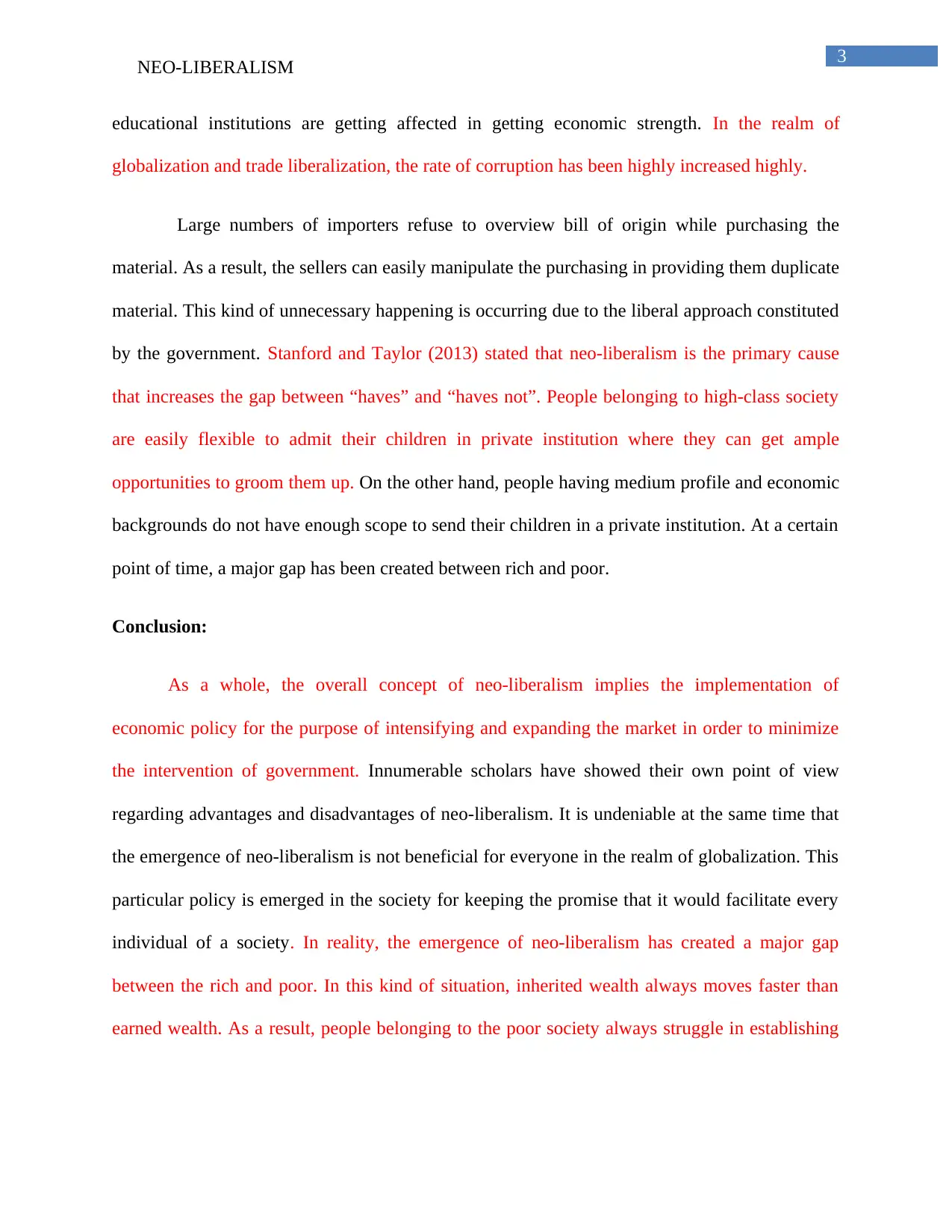
3
NEO-LIBERALISM
educational institutions are getting affected in getting economic strength. In the realm of
globalization and trade liberalization, the rate of corruption has been highly increased highly.
Large numbers of importers refuse to overview bill of origin while purchasing the
material. As a result, the sellers can easily manipulate the purchasing in providing them duplicate
material. This kind of unnecessary happening is occurring due to the liberal approach constituted
by the government. Stanford and Taylor (2013) stated that neo-liberalism is the primary cause
that increases the gap between “haves” and “haves not”. People belonging to high-class society
are easily flexible to admit their children in private institution where they can get ample
opportunities to groom them up. On the other hand, people having medium profile and economic
backgrounds do not have enough scope to send their children in a private institution. At a certain
point of time, a major gap has been created between rich and poor.
Conclusion:
As a whole, the overall concept of neo-liberalism implies the implementation of
economic policy for the purpose of intensifying and expanding the market in order to minimize
the intervention of government. Innumerable scholars have showed their own point of view
regarding advantages and disadvantages of neo-liberalism. It is undeniable at the same time that
the emergence of neo-liberalism is not beneficial for everyone in the realm of globalization. This
particular policy is emerged in the society for keeping the promise that it would facilitate every
individual of a society. In reality, the emergence of neo-liberalism has created a major gap
between the rich and poor. In this kind of situation, inherited wealth always moves faster than
earned wealth. As a result, people belonging to the poor society always struggle in establishing
NEO-LIBERALISM
educational institutions are getting affected in getting economic strength. In the realm of
globalization and trade liberalization, the rate of corruption has been highly increased highly.
Large numbers of importers refuse to overview bill of origin while purchasing the
material. As a result, the sellers can easily manipulate the purchasing in providing them duplicate
material. This kind of unnecessary happening is occurring due to the liberal approach constituted
by the government. Stanford and Taylor (2013) stated that neo-liberalism is the primary cause
that increases the gap between “haves” and “haves not”. People belonging to high-class society
are easily flexible to admit their children in private institution where they can get ample
opportunities to groom them up. On the other hand, people having medium profile and economic
backgrounds do not have enough scope to send their children in a private institution. At a certain
point of time, a major gap has been created between rich and poor.
Conclusion:
As a whole, the overall concept of neo-liberalism implies the implementation of
economic policy for the purpose of intensifying and expanding the market in order to minimize
the intervention of government. Innumerable scholars have showed their own point of view
regarding advantages and disadvantages of neo-liberalism. It is undeniable at the same time that
the emergence of neo-liberalism is not beneficial for everyone in the realm of globalization. This
particular policy is emerged in the society for keeping the promise that it would facilitate every
individual of a society. In reality, the emergence of neo-liberalism has created a major gap
between the rich and poor. In this kind of situation, inherited wealth always moves faster than
earned wealth. As a result, people belonging to the poor society always struggle in establishing
Paraphrase This Document
Need a fresh take? Get an instant paraphrase of this document with our AI Paraphraser
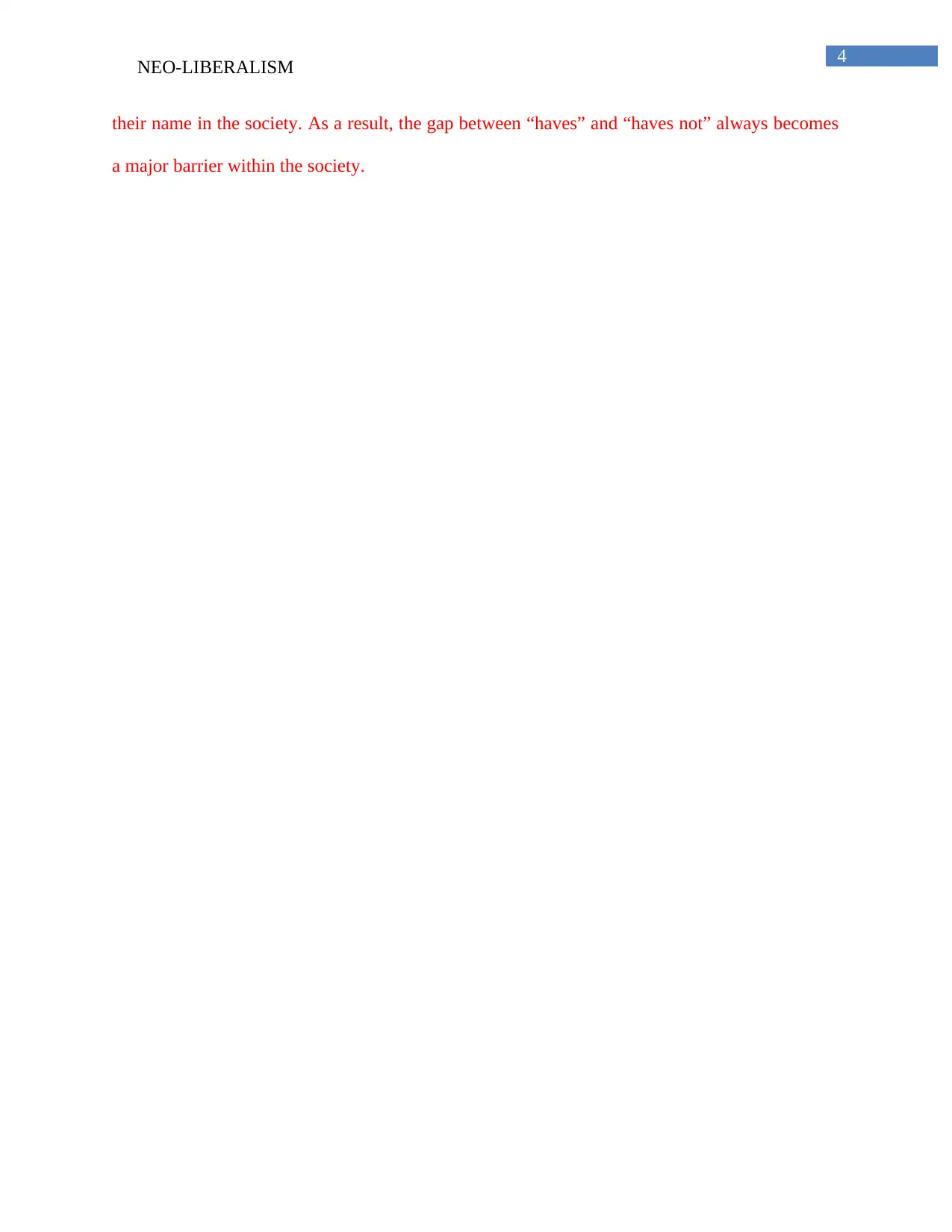
4
NEO-LIBERALISM
their name in the society. As a result, the gap between “haves” and “haves not” always becomes
a major barrier within the society.
NEO-LIBERALISM
their name in the society. As a result, the gap between “haves” and “haves not” always becomes
a major barrier within the society.
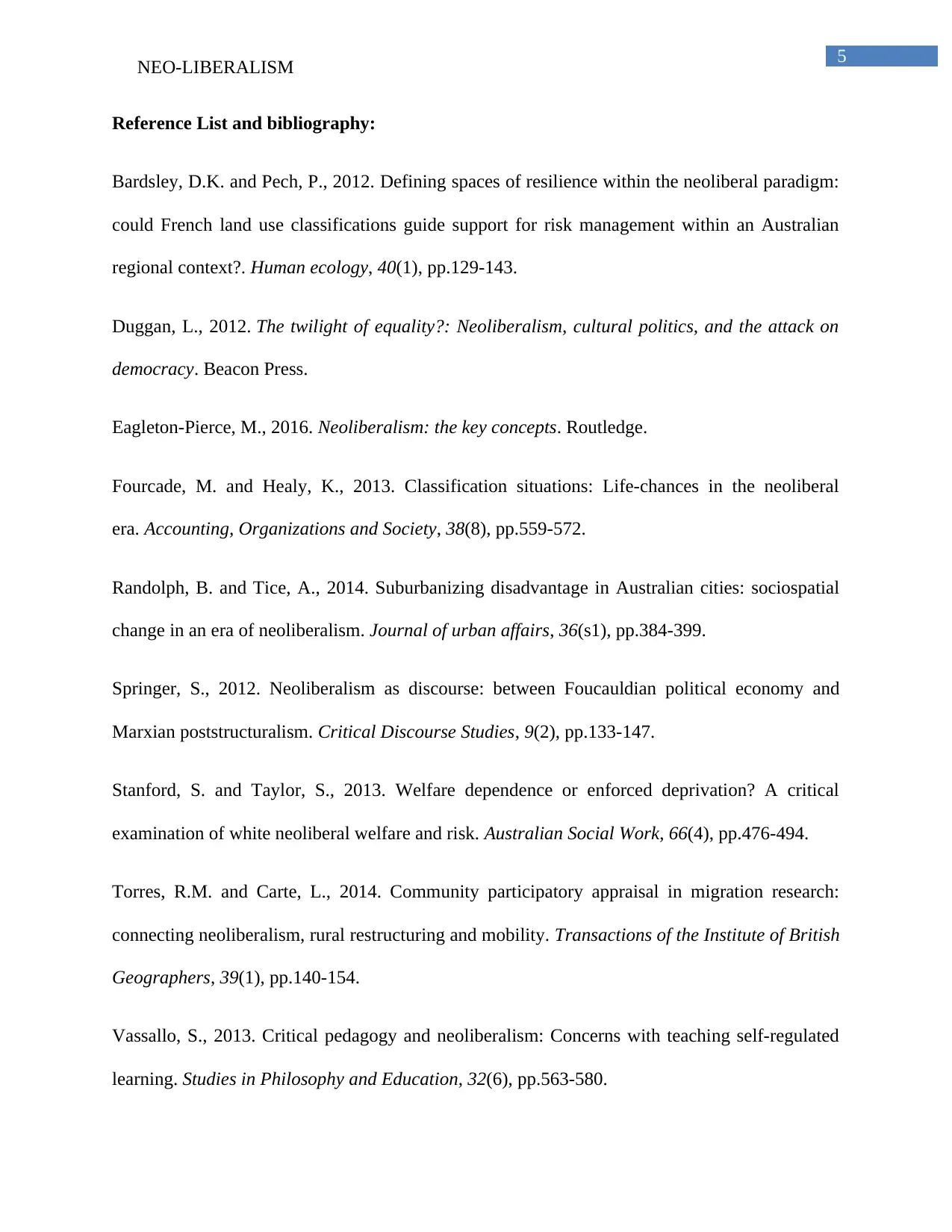
5
NEO-LIBERALISM
Reference List and bibliography:
Bardsley, D.K. and Pech, P., 2012. Defining spaces of resilience within the neoliberal paradigm:
could French land use classifications guide support for risk management within an Australian
regional context?. Human ecology, 40(1), pp.129-143.
Duggan, L., 2012. The twilight of equality?: Neoliberalism, cultural politics, and the attack on
democracy. Beacon Press.
Eagleton-Pierce, M., 2016. Neoliberalism: the key concepts. Routledge.
Fourcade, M. and Healy, K., 2013. Classification situations: Life-chances in the neoliberal
era. Accounting, Organizations and Society, 38(8), pp.559-572.
Randolph, B. and Tice, A., 2014. Suburbanizing disadvantage in Australian cities: sociospatial
change in an era of neoliberalism. Journal of urban affairs, 36(s1), pp.384-399.
Springer, S., 2012. Neoliberalism as discourse: between Foucauldian political economy and
Marxian poststructuralism. Critical Discourse Studies, 9(2), pp.133-147.
Stanford, S. and Taylor, S., 2013. Welfare dependence or enforced deprivation? A critical
examination of white neoliberal welfare and risk. Australian Social Work, 66(4), pp.476-494.
Torres, R.M. and Carte, L., 2014. Community participatory appraisal in migration research:
connecting neoliberalism, rural restructuring and mobility. Transactions of the Institute of British
Geographers, 39(1), pp.140-154.
Vassallo, S., 2013. Critical pedagogy and neoliberalism: Concerns with teaching self-regulated
learning. Studies in Philosophy and Education, 32(6), pp.563-580.
NEO-LIBERALISM
Reference List and bibliography:
Bardsley, D.K. and Pech, P., 2012. Defining spaces of resilience within the neoliberal paradigm:
could French land use classifications guide support for risk management within an Australian
regional context?. Human ecology, 40(1), pp.129-143.
Duggan, L., 2012. The twilight of equality?: Neoliberalism, cultural politics, and the attack on
democracy. Beacon Press.
Eagleton-Pierce, M., 2016. Neoliberalism: the key concepts. Routledge.
Fourcade, M. and Healy, K., 2013. Classification situations: Life-chances in the neoliberal
era. Accounting, Organizations and Society, 38(8), pp.559-572.
Randolph, B. and Tice, A., 2014. Suburbanizing disadvantage in Australian cities: sociospatial
change in an era of neoliberalism. Journal of urban affairs, 36(s1), pp.384-399.
Springer, S., 2012. Neoliberalism as discourse: between Foucauldian political economy and
Marxian poststructuralism. Critical Discourse Studies, 9(2), pp.133-147.
Stanford, S. and Taylor, S., 2013. Welfare dependence or enforced deprivation? A critical
examination of white neoliberal welfare and risk. Australian Social Work, 66(4), pp.476-494.
Torres, R.M. and Carte, L., 2014. Community participatory appraisal in migration research:
connecting neoliberalism, rural restructuring and mobility. Transactions of the Institute of British
Geographers, 39(1), pp.140-154.
Vassallo, S., 2013. Critical pedagogy and neoliberalism: Concerns with teaching self-regulated
learning. Studies in Philosophy and Education, 32(6), pp.563-580.
⊘ This is a preview!⊘
Do you want full access?
Subscribe today to unlock all pages.

Trusted by 1+ million students worldwide
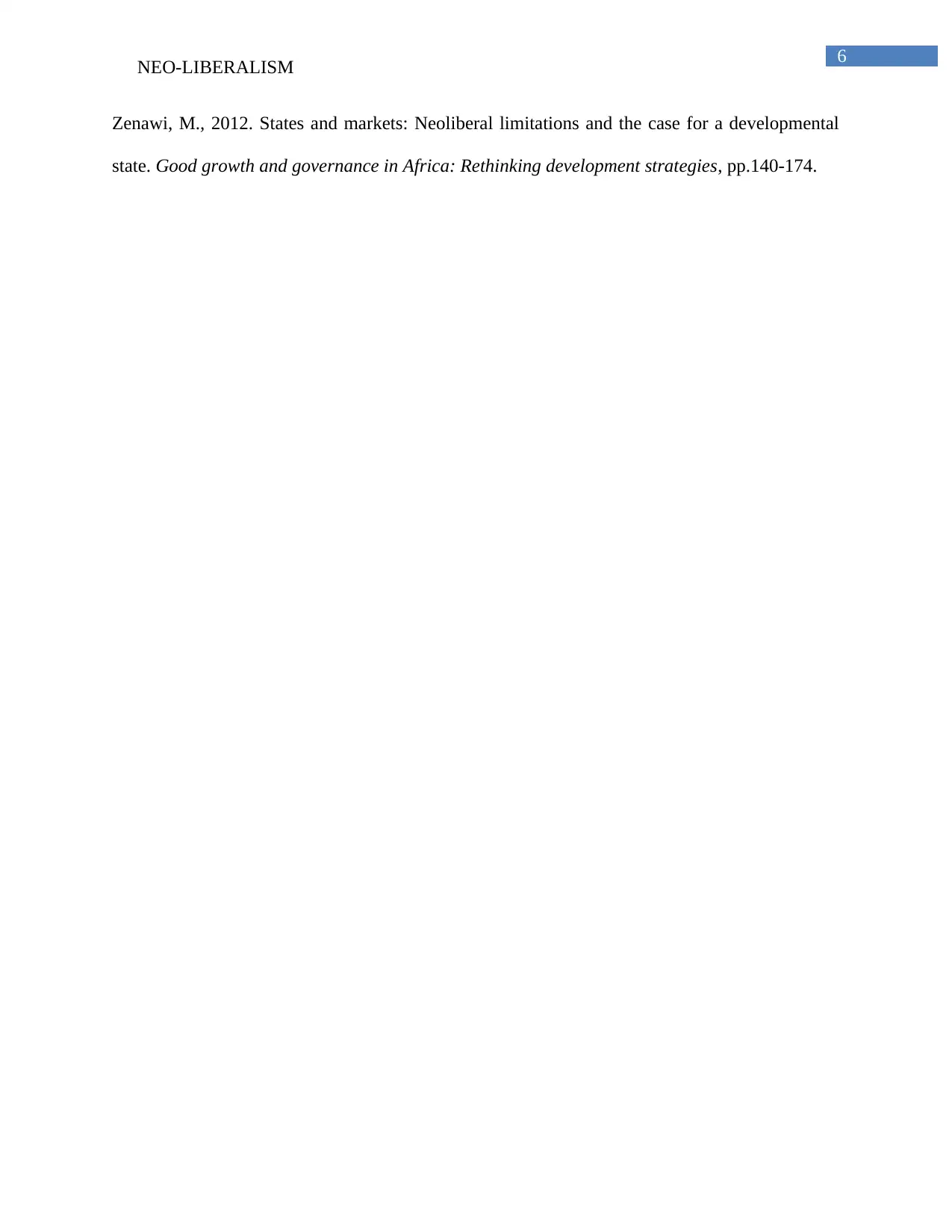
6
NEO-LIBERALISM
Zenawi, M., 2012. States and markets: Neoliberal limitations and the case for a developmental
state. Good growth and governance in Africa: Rethinking development strategies, pp.140-174.
NEO-LIBERALISM
Zenawi, M., 2012. States and markets: Neoliberal limitations and the case for a developmental
state. Good growth and governance in Africa: Rethinking development strategies, pp.140-174.
1 out of 7
Related Documents
Your All-in-One AI-Powered Toolkit for Academic Success.
+13062052269
info@desklib.com
Available 24*7 on WhatsApp / Email
![[object Object]](/_next/static/media/star-bottom.7253800d.svg)
Unlock your academic potential
Copyright © 2020–2026 A2Z Services. All Rights Reserved. Developed and managed by ZUCOL.




